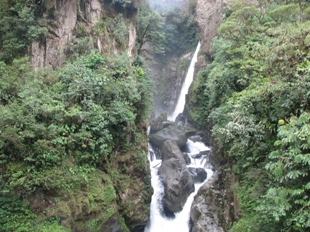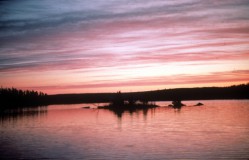Rights for Nature

Pailón del Diablo waterfall, Baños, Ecuador; Creative Commons Attribution-Share Alike 3.0 Unported
In 2008, the Ecuador National Assembly passed a constitutional amendment granting the most extensive rights for nature that exist anywhere in the world. The Ecuador constitution grants rights to its citizens which countries like Canada would do well to emulate, e.g. an inalienable right to water or “the right to safe and permanent access to healthy, sufficient and nutritional food”. Further sections guarantee specific rights to biodiversity, soil, water, and natural resources. It also grants rights to nature recognizing its “right to integral respect for its existence and for the maintenance and regeneration of its life cycles, structure, functions and evolutionary processes”.
For the first time in history, nature is treated as something more than mere property, or as a set of resources to be exploited, but as something deserving respect and rights for its own sake.
Since then, other countries, notably Ecuador’s Andean neighbour Bolivia, have followed suit. A 2011 conference in Montreal welcomed the anniversary of the Bolivia’s Cochabamba Declaration and the growing global recognition of the rights of nature.
Currently, Canada seems to be sliding backwards, abridging protections for the environment, cancelling environmental assessments, and replacing the our oldest environmental legislation, the Navigable Waters Protection Act..
 Manitoba has an opportunity to show leadership. We are home to the largest expanse of undeveloped wilderness in the world, the UNESCO nominated Heart of the Boreal region east of Lake Winnipeg. Next year we are launching the Canadian Museum for Human Rights. What better way to recognize the importance of nature than by recognising the rights of nature here in Manitoba. With the province reviewing the Sustainable Development Act, the timing could not be better.
Manitoba has an opportunity to show leadership. We are home to the largest expanse of undeveloped wilderness in the world, the UNESCO nominated Heart of the Boreal region east of Lake Winnipeg. Next year we are launching the Canadian Museum for Human Rights. What better way to recognize the importance of nature than by recognising the rights of nature here in Manitoba. With the province reviewing the Sustainable Development Act, the timing could not be better.
The Nature of Things will explore the importance of in an upcoming documentary, David Suzuki’s Andean Adventure airs on The Nature of Things, Jan. 10, at 8 p.m. on CBC-TV.
Read the full Ecuador constitution. or the excerpt below:
Rights of nature
Article 71. Nature, or Pacha Mama, where life is reproduced and occurs, has the right to integral respect for its existence and for the maintenance and regeneration of its life cycles, structure, functions and evolutionary processes.
All persons, communities, peoples and nations can call upon public authorities to enforce the rights of nature. To enforce and interpret these rights, the principles set forth in the Constitution shall be observed, as appropriate.
The State shall give incentives to natural persons and legal entities and to communities to protect nature and to promote respect for all the elements comprising an ecosystem.
Article 72. Nature has the right to be restored. This restoration shall be apart from the obligation of the State and natural persons or legal entities to compensate individuals and communities that depend on affected natural systems.
In those cases of severe or permanent environmental impact, including those caused by the exploitation of nonrenewable natural resources, the State shall establish the most effective mechanisms to achieve the restoration and shall adopt adequate measures to eliminate or mitigate harmful environmental consequences.
Article 73. The State shall apply preventive and restrictive measures on activities that might lead to the extinction of species, the destruction of ecosystems and the permanent alteration of natural cycles.
The introduction of organisms and organic and inorganic material that might definitively alter the nation’s genetic assets is forbidden.
Article 74. Persons, communities, peoples, and nations shall have the right to benefit from the environment and the natural wealth enabling them to enjoy the good way of living.
Environmental services shall not be subject to appropriation; their production, delivery, use and development shall be regulated by the State.



Recent Comments